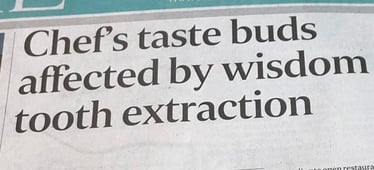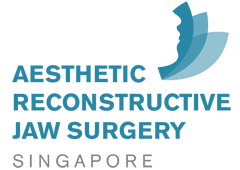Share this
Loss of tongue sensation after wisdom tooth surgery
on September 9, 2019
 Recently, an article in The Straits Times featured a case of a chef suing a dentist for causing him to lose sensation of his tongue after a wisdom tooth surgery. Certainly, for a chef, such a complication can be a career-ending event. So, how does a wisdom tooth surgery lead to numbness of the tongue and what can be done about it.
Recently, an article in The Straits Times featured a case of a chef suing a dentist for causing him to lose sensation of his tongue after a wisdom tooth surgery. Certainly, for a chef, such a complication can be a career-ending event. So, how does a wisdom tooth surgery lead to numbness of the tongue and what can be done about it.
Surgical removal of a wisdom tooth in the lower jaw is one of the most common oral surgical procedures. These teeth are usually impacted, meaning, they are aligned in the wrong direction and as a result, are unable to fully erupt into the mouth and are jammed against the neighbouring tooth. These impacted wisdom teeth commonly cause pain due to tooth decay and gum infection as they are difficult to clean.
Extraction of such teeth requires surgery, which involves
- Injection of a local anaesthetic to block sensation of the jaw and teeth
- making an incision on the gum around the tooth
- peeling the gum off the bone to expose the tooth and bone
- drilling away some bone that is holding on to the tooth
- drilling the tooth into smaller parts for easier removal
- sutures to stitch the gum back.
Two sensory nerves are potentially involved whenever wisdom teeth in the lower jaw is removed. One nerve enters the jaw bone from behind and runs internally within the bone until the region of the premolars where it exits the bone through a hole called the mental foramen, and enters the lip. This nerve, the inferior alveolar nerve, provides sensation to the lower jaw bone and associated teeth, and the lower lip and chin on the same side. Injury to this nerve causes loss of sensation to these structures. Because this nerve runs within the bone, it can be visualized on radiographs preoperatively and the dentist will be able to assess the risk level of associated with the surgery.
The other nerve is the lingual nerve. This nerve runs alongside the inner surface of the lower jaw. Studies have shown that the path of this nerve is highly variable. In many cases, it is very close to the lower wisdom tooth. The lingual nerve provides sensation to the tongue. Nerves providing taste as well as nerves controlling secretion of saliva joins the lingual nerve bundle as well. As such, the lingual nerve is a rather thick bundle. As it is not housed within bone, it cannot be visualized in radiographs and there is no way of preoperatively knowing the path of the nerve. Injury to this nerve affects not just the sensation of touch, but also the sensation of taste and secretory function of the minor salivary glands in the tongue.
How does the lingual nerve get injured?
Lingual nerve injuries may be caused by excessive stretching or compression, laceration and complete tearing. In stretch and compression injuries, the nerve is intact and there is usually a good chance of recovery. When the nerve is lacerated, this is a break in some of the fibers within the nerve that transmit sensation, resulting in a loss of some sensation, depending on which fibers are torn. When the nerve is completely severed, there will be a complete lost of all sensation. Most of compression or stretch injuries do not result in permanent or significant loss of sensation, but recovery generally takes place over several months. Laceration of the nerve comes in different degrees with varying levels of sensation loss with their corresponding chances of recovery. Severe cases may require surgical repair. Nerves that are completely severed needs surgical repair or maybe even nerve grafting to regain some sensation.
At every stage of the surgery, there is a chance of injury. Injection of the local anesthetic itself may cause injury to the nerve either by direct trauma from the needle or due to the toxicity of some local anesthetic drugs.
The lingual nerve may also be injured when making incisions on the gums. In a small minority of patients, the lingual nerve may actually lie just on top of the gum covering the crest of the bone where incisions are made. In such cases, the incision may actually sever the nerve resulting in complete numbness of the tongue. This is a rare occurrence but nonetheless exists. Up to 10% of lingual nerves may be found lying within the gum at the level of the bone, rendering it susceptible to injury during surgical removal of wisdom teeth.
After the incision is made, the gum needs to be stripped from the bone to expose the tooth. This act of stripping the gum may also cause stretch injuries to the nerve. Stretch injuries are usually temporary and spontaneous recovery is usually expected. Some dentists practice a technique that include stripping the gum on the tongue side of the wisdom tooth, in an attempt to prevent injury to the lingual nerve. However, it has been found that this procedure that was designed to prevent injury actually had been a cause of laceration injuries to the lingual nerve.
The next step involves the use of drills to remove bone and divide the tooth into small pieces. Any slippage of the drill beyond the tooth and bone may cause significant damage to the lingual nerve resulting in loss of sensation of the tongue. Finally, stitching gum together also pose a risk as the needle can be passed through or stretch the nerve.
Most of the time, injury to the nerve is unnoticed at the time of occurrence. This is because the nerve is embedded within soft tissue of gum, muscles and direct contact of any instrument is usually not visible. Furthermore, the patient would have been anesthetized for the surgery and would not be able to feel the trauma to the nerve intraoperatively. It is usually when the numbness persists beyond the expected duration that raises suspicion that the nerve may be injured. In the immediate postoperative period, there is usually some degree of swelling and pain which may also mask the effect of the nerve injury.
How often does this happen?
There are many epidemiologic studies reporting the loss of tongue sensation after wisdom teeth surgery. Reports indicated an incidence of temporary alteration of sensation ranging from 0% to 23% while that of permanent alteration of sensation ranges between 0% and 8%. These studies did not separate the wide variation in degrees of complexity of the impaction, the skill level of the dentist, the type of anesthesia used, age of patients, etc. As such, for someone considering whether to proceed with having the wisdom tooth removed, such a wide range in risk level is not particularly helpful.
What can be done when injury of the lingual nerve has happened?
As there is no actual visualization of the injury taking place, the first course of action is to document the degree and extent of the loss of sensation by testing with various instruments.
Mapping: the area of the tongue affected can be mapped by touching the tongue with a sharp pointed instrument and checking responses from the patient. The area of the tongue that is affected is then recorded either in a drawing or photograph. Lingual nerves do not cross over the midline and so the area affected is confined to the same side as the wisdom tooth surgery.
Two-point discrimination: this is a measurement of the ability of the tongue to discern between being touched with a single point or two points. The part where sensation is affected will require a greater distance between the two points before being able to differentiate it from a single point. This is compared with the uninjured side to assess the degree of injury sustained.
Temperature sense: heat and cold sensation are transmitted by different nerve fibers inside the lingual nerve. Separately testing temperature sense is needed to document if the injury extends to these fibers. This can be done easily with a heated instrument and some ice.
Pressure sensation: a calibrated force measurement device can be used to record the minimum pressure that needs to be exerted on the affected part of the tongue before it can be felt. The unaffected side is also measured for comparison.
Direction sense: a light brush is applied to the unaffected side in random directions and the rate of correct responses from the patient is recorded.
However, these measurements depend on the subjective feedback from the patient which may be variable. Objective measurements can be done in the form of testing nerve conduction through the use of electrodes to determine nerve function.
Recording the responses of the patient over time gives an indication of whether the sensation is improving or not. If there is a high degree of numbness with no discernible improvement after a few months, surgical repair may be considered.
Can surgery or medication help in regaining sensation?
Surgical repair of the lingual nerve can be beneficial in some cases. When there is complete loss of sensation for more than three months or a severe loss of sensation for more than four months, surgically repairing the nerve may help the patient regain some sensation. Surgical repair is also indicated when there is pain instead of numbness. In such a situation, there is likely to be a neuroma, akin to a nerve scar, which has formed when the injured nerve tried to grow back. Post-surgical repair, medication may be needed to manage any residual pain.
However, the outcome of nerve repair surgery is unpredictable and should only be done after weighing the risks against the potential benefits. It is advisable to wait a few months to observe for spontaneous recovery instead of performing early surgery.
What risk factors predispose to lingual nerve injury?
Studies have indicated that wisdom teeth that are impacted distoangularly are most prone to lead to lingual nerve injury. These are wisdom teeth are partially erupted pointing backwards towards the back of the jaw instead of pointing to the front. These teeth require a greater amount of bone removal at the back, close to where the lingual nerve usually lies. Careful physical examination and x-rays such as CT scans can provide the dentist with a clearer picture of the bone removal needed and the path of extraction of the tooth.
The patient’s age may also be a risk factor. Most wisdom tooth surgery patients are teenagers or young adults with relatively softer jaw bone. Surgery in an older patient whose bone has hardened will require greater force to be applied when stretching the gums as well as when removing the tooth. This may predispose to a higher incidence of lingual nerve injury.
The skill of the dentist is also a factor. Naturally, a dentist who has not performed a lot of such surgeries may pose a higher risk than one who has had a lot of experience. Specialists in oral and maxillofacial surgery have undergone additional years of supervised training in such procedures may be better able to avoid such injuries compare to dentists who are not oral and maxillofacial surgeons.
Surgical removal of wisdom teeth is one of the most common surgical procedures in dentistry. Like any other surgery, it has its potential risks and complications. Decision to undergo any surgery including wisdom tooth surgery, needs take into consideration the risk versus the benefits of the surgery. It is not possible to eliminate all risks and even in the best of hands, complications do arise.
Share this
- Jaw Surgery (93)
- Dental Implants Singapore (90)
- Orthognathic Surgery (48)
- Replacing Missing Teeth (26)
- Missing Teeth Options (23)
- Underbite (23)
- Bone Grafting (21)
- Costs (18)
- Facial Aesthetics (18)
- Aesthetics (17)
- dental implants (16)
- corrective jaw surgery (15)
- BOTOX (11)
- Dermal Fillers (11)
- Wisdom teeth (10)
- Fixed Implant Dentures (8)
- Loose Dentures Singapore (6)
- Medisave (6)
- sleep apnea (6)
- Braces (5)
- Dental Pain (5)
- Dentures in Singapore (5)
- Loose Teeth (5)
- Tooth Extraction (5)
- jaw deformities (5)
- bimax (4)
- bone graft (4)
- maxillomandibular advancement (4)
- all-on-4 (3)
- bimaxillary protrusion (3)
- chin implant (3)
- facial asymmetry (3)
- full mouth dental implants (3)
- genioplasty (3)
- immediate implant (3)
- removal of an integrated dental implant (3)
- third molars (3)
- wisdom tooth surgery (3)
- My Dentures Don't Fit (2)
- VME (2)
- bone graft healing (2)
- distraction osteogenesis (2)
- medical tourism (2)
- obstructive sleep apnea (2)
- orthodontics (2)
- plastic surgery (2)
- CT guided dental implants (1)
- Double jaw surgery (1)
- Invisalign (1)
- Periodontal Disease (1)
- Permanent Dentures Singapore (1)
- before and after photos (1)
- facial trauma (1)
- fractured dental implant (1)
- oral appliance therapy (1)
- root canal treatment (1)
- veneers (1)
- vertical maxillary excess (1)
- September 2019 (2)
- July 2019 (2)
- May 2019 (2)
- August 2018 (1)
- October 2017 (1)
- September 2017 (2)
- August 2017 (1)
- June 2017 (2)
- May 2017 (4)
- April 2017 (1)
- March 2017 (1)
- February 2017 (3)
- January 2017 (3)
- December 2016 (1)
- November 2016 (2)
- October 2016 (4)
- September 2016 (9)
- August 2016 (5)
- July 2016 (11)
- June 2016 (14)
- May 2016 (6)
- April 2016 (2)
- March 2016 (1)
- January 2016 (7)
- December 2015 (10)
- November 2015 (4)
- October 2015 (9)
- September 2015 (7)
- August 2015 (1)
- July 2015 (6)
- June 2015 (3)
- May 2015 (7)
- April 2015 (5)
- March 2015 (8)
- January 2015 (5)
- December 2014 (7)
- November 2014 (7)
- October 2014 (6)
- September 2014 (8)
- August 2014 (5)
- July 2014 (7)
- June 2014 (8)
- May 2014 (9)
- April 2014 (10)
- March 2014 (6)
- February 2014 (8)
- January 2014 (3)
Subscribe by email
Email subscription




Comments (4)